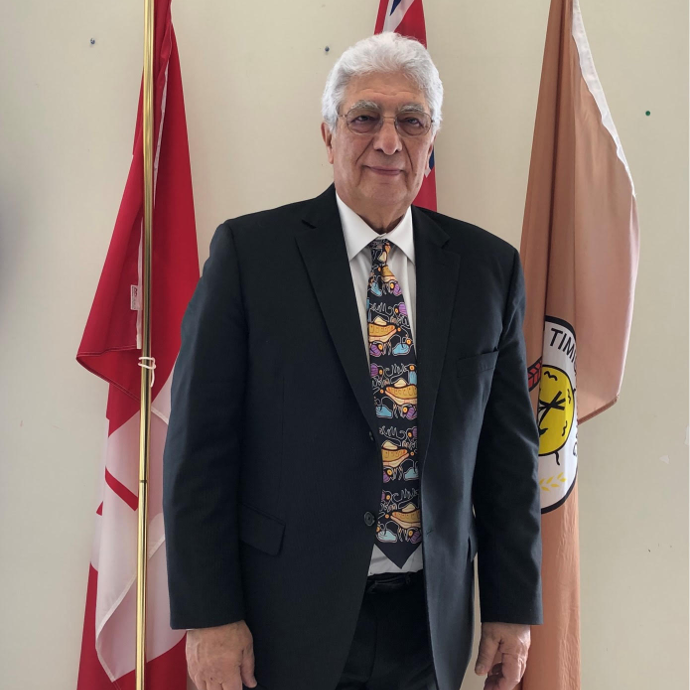
On August 19, Justice Leonard (Tony) Mandamin, a University of Alberta Faculty of Law alumnus, retires from his position as a judge of the Federal Court of Canada and will dive into another significant intellectual challenge - earning a master's degree in the Faculty of Native Studies.
"I have a strong interest in the re-emergence of Aboriginal restorative justice," wrote Mandamin in his thesis proposal. He intends to identify the common elements of Aboriginal restorative justice initiatives across Canada so that they can be recognized by the criminal justice system and adopted more broadly.
Now 75 years old, Mandamin has reached the mandatory retirement age for judges after serving at the Federal Court for 12 years, on the bench for 20 and in the legal profession for 35.
When he earned his LLB in 1982, he was one of the earliest Indigenous graduates of UAlberta Law. He went on to accumulate many "firsts" during a distinguished career as an Indigenous lawyer, a judge of the Provincial Court of Alberta and subsequently of the Federal Court.
While a young lawyer, he represented Indigenous clients across Alberta. As a Provincial Court judge and later as a Federal Court justice, he presided over traditional justice initiatives and dealt with numerous matters in which Indigenous perspectives were heard in the Canadian justice system, often for the first time.
In R v. Badger, a leading Supreme Court of Canada decision on the scope of Indian treaty rights, Mandamin and his co-counsel represented three treaty Indian hunters charged for hunting without a license or out of season, though their treaty assured them of the right to hunt for food. Mandamin, facing opposition from the attorneys general of Alberta, Saskatchewan, Manitoba and Canada, recruited the support of eight treaty, provincial and national First Nations organizations, resulting in the Supreme Court confirming the continued existence of that treaty right in a decision that continues to be frequently cited.
"It was a milestone for treaties," said Mandamin. "The Supreme Court said that treaties are sacred and that the spirit and intent of treaties should be honoured."
In June 2018, the Law Society of Ontario presented him with an honorary doctorate for the myriad ways his leadership ensured that an Indigenous perspective was included within the administration of justice in Canada, making special note of his role in development of the Federal Court's Aboriginal Litigation Guidelines. The guidelines recognize the important role of Indigenous elders and ensures elders are treated with respect during litigation.
"His career shows that he has been both imaginative and effective in creating legal initiatives for the betterment of Indigenous People," said David Percy, QC, dean of the Faculty of Law, who has known Mandamin since the latter was a law student at the Faculty.
Mandamin grew up on the Wikwemikong Unceded Indian Reserve on Manitoulin Island, Ont. and began advocating for Indigenous justice early. As Grade 10 student council president, he led a vote to reject his school principal's plan to have older student prefects report on children who spoke their own language - Anishinaabemowin - at his Indian reserve school. He was inspired by the memory of an elderly Council member who had once defied a government Indian agent's demand that the First Nation council meetings be conducted in English only.
"In the late 1950s early 1960s, the predominant attitude toward Indigenous culture was very negative." said Mandamin. "Language was suppressed, ceremony banned and culture was discouraged." But in the 1960s, Wiikwemikoong re-introduced its cultural festival, helping revive Indigenous culture. That inspired Mandamin to become involved in Indigenous activism and then to study law.
Among his other notable cases as a lawyer, Mandamin was counsel before the Indian Claims Commission in the Cold Lake First Nations Claim. Those First Nations had been expelled from their traditional hunting, trapping and fishing territories in 1954 so the federal government could establish the Primrose Lake Air Weapons Range. For many years, Mandamin assisted advancing their compensation claim for expulsion from their traditional lands. The claim was accepted and negotiations were well underway when Mandamin was appointed to the Provincial Court of Alberta. Later the compensation provided, land, economic benefits and a multimillion dollar settlement, which enabled the Cold Lake First Nations to re-establish deriving a livelihood from their traditional lands.
As a Provincial Court judge, Mandamin helped the Tsuu T'ina First Nation establish a peacemaker court that still works with community peacemakers to resolve conflicts that give rise to criminal offenses.
Mandamin also encouraged other Indigenous law students. "I suspect that his record of employing six Indigenous articling students out of a total of seven remains a record to this day," said Percy. Mandamin continued that endeavour as a Provincial Court judge, admitting four Indigenous candidates to the Law Society of Alberta, and as a Federal Court justice, taking on five Indigenous law clerks.
Elements of this article were published in the Spring/Summer 2019 edition of UAlberta Law's alumni magazine.